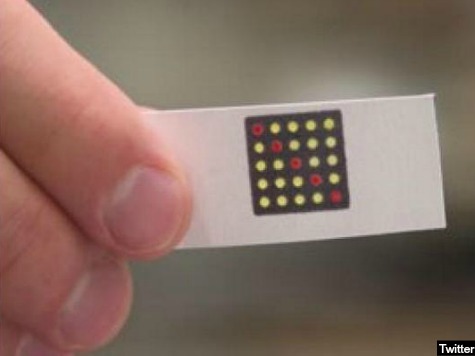A team of researchers led by Harvard University Professor James J. Collins has revealed a revolutionary way to test for Ebola using blotting paper that can freeze-dry living material for use in a diagnostic, requiring only $20 worth of material.
As CNBC reports, Collins’ group reportedly used the blotting paper with freeze-dried genetic material on it to diagnose Ebola. The test took only 30 minutes, dramatically reducing the current amount of time necessary to confirm that a patient is carrying the Ebola virus.
The findings, published in the scientific journal Cell, unlock a door to a potential variety of quick and easy diagnoses. The resulting product, the group writes in its abstract, can be used in “programmable in vitro diagnostics, including glucose sensors and strain-specific Ebola virus sensors.” Such a system “provides an alternate, versatile venue for synthetic biologists to operate and a much-needed medium for the safe deployment of engineered gene circuits beyond the lab.”
The process is essentially one of preserving genetic material that can be used to test for multiple strains of Ebola–what the BBC calls “living powdered soup.” Cells are freeze-dried on paper, to be reanimated at any time for use. This allows them to be transported around the world for research and medical development. “Once they’re rehydrated, these biological circuits function in these small paper disks as if they were inside a living cell,” explains Collins.
The research group insisted that the test as it currently exists could not be used in areas where the outbreak has taken hold in West Africa, “but it would be simple to devise one that is.” The freeze-drying process is of particular advantage to those regions where refrigeration is not so easy to come by, the team tells BBC. Properly diagnosing Ebola in Africa could be particularly helpful to hospitals currently overflowing with patients–a crisis that has harmed not only Ebola patients turned away from hospital doors, but those suffering from other illnesses who cannot get the proper medical attention because they are assumed to be Ebola patients.
As more than 10,000 Ebola cases have been recorded in West Africa under the conservative “official” count, the outbreak currently ravaging West Africa has demanded innovation from the scientific community in real time. The experimental Ebola drug ZMapp made its debut on two American Ebola patients–Dr. Kent Brantly and Nancy Writebol, both workers with the Christian charity Samaritan’s Purse. Dr. Brantly has donated his blood numerous times to Ebola patients for another experimental procedure: giving Ebola patients the blood of a person who has survived the disease, which should be chock-full of antibodies produced to keep the virus at bay.

COMMENTS
Please let us know if you're having issues with commenting.